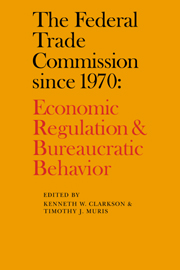Book contents
- Frontmatter
- Contents
- List of contributors
- Preface
- 1 Introduction
- Part I The institutional setting
- Part II Nature and consequence of FTC actions
- Introduction
- 6 Bureau of Competition: antitrust enforcement activities
- 7 Information for antitrust and business activity: line-of-business reporting
- 8 Industry structure investigations: Xerox's multiple patents and competition
- 9 Exclusionary practices: shopping center restrictive covenants
- 10 Legislative powers: FTC rule making
- 11 Rewriting consumer contracts: creditors' remedies
- 12 Regulating postpurchase relations: mobile homes
- 13 Regulating information: advertising overview
- 14 Special statutes: the structure and operation of the Magnuson-Moss Warranty Act
- Part III Conclusions and reforms
- Notes
- Selected bibliography
- Index
10 - Legislative powers: FTC rule making
Published online by Cambridge University Press: 05 November 2011
- Frontmatter
- Contents
- List of contributors
- Preface
- 1 Introduction
- Part I The institutional setting
- Part II Nature and consequence of FTC actions
- Introduction
- 6 Bureau of Competition: antitrust enforcement activities
- 7 Information for antitrust and business activity: line-of-business reporting
- 8 Industry structure investigations: Xerox's multiple patents and competition
- 9 Exclusionary practices: shopping center restrictive covenants
- 10 Legislative powers: FTC rule making
- 11 Rewriting consumer contracts: creditors' remedies
- 12 Regulating postpurchase relations: mobile homes
- 13 Regulating information: advertising overview
- 14 Special statutes: the structure and operation of the Magnuson-Moss Warranty Act
- Part III Conclusions and reforms
- Notes
- Selected bibliography
- Index
Summary
The Federal Trade Commission Improvement Act of 1975 (FTCIA) expressly authorizes the FTC to promulgate rules that “define with specificity acts or practices which are unfair or deceptive,” the knowing violation of which may result in a “civil penalty” of $10,000. The FTC has thus become a powerful consumer protection agency. Whether consumer welfare will thereby be enhanced depends on the manner in which this rule making authority is implemented by the FTC, particularly the care with which the Commission constructs its Trade Regulation Rules (TRRs) to comport with the economic realities of the marketplace. As the more detailed analysis of specific TRRs in succeeding chapters confirms, the experience to date is disquieting.
This chapter addresses in a general way the question of whether the FTC is implementing its rule-making power in a manner that will effectively improve consumer welfare. Particular rules are analyzed in depth in the chapters that follow. This chapter provides an overview of some of the recurring problems in the FTC's approach to rule making, and draws for the most part upon rules that are not the subjects of intensive particularized analysis in later chapters. It begins with a brief description of the origin and framework of the Commission's rule-making authority and summarizes the types of rules adopted or proposed. Because the statute authorizes rules that proscribe practices found to be “unfair or deceptive,” the Commission's efforts to provide some content to those vague concepts are then analyzed.
- Type
- Chapter
- Information
- The Federal Trade Commission since 1970Economic Regulation and Bureaucratic Behavior, pp. 161 - 183Publisher: Cambridge University PressPrint publication year: 1981
- 1
- Cited by

